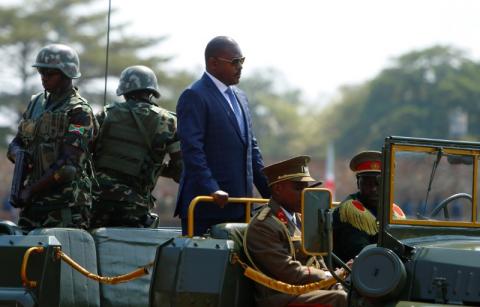Advertisement
Burundians forced to sign up to vote in referendum, opposition says
NAIROBI (Reuters) - Burundians are being forced to sign up to vote in a May referendum on extending presidential term limits, Burundian opposition figures and residents say, although the government denies the allegations.
The constitutional amendment would extend the presidential term to seven years from five, allowing President Pierre Nkurunziza to run again in 2020. It would limit the president to two consecutive seven-year terms, but won't take into account previous terms, potentially extending his rule to 2034.
The deputy chairman of the opposition FRODEBU party, Léonce Ngendakumana, told Reuters on Saturday citizens were being intimidated into signing up to vote in a week-long registration exercise which ends on Saturday.
"Checkpoints have been set up, likely by youths of the ruling party, to check receipts (of registration). Students who have not been registered are sent back to do so,” Ngendakumana said.
“This referendum is organized in total opacity and extreme intimidation. A referendum held in such conditions will result to a biased outcome."
Nkurunziza came to power in 2005 after a peace deal ended a decade of civil war between the Tutsi-dominated army and Hutu rebels, in which 300,000 people were killed.
He ran for a third term in 2015, which opponents said violated the terms of the peace deal, sparking clashes resulting in hundreds of deaths. Nearly 430,000 people have fled the tiny East African nation of 10.5 million.
REGISTRATION DRIVE
A traveller who requested anonymity confirmed to Reuters he had been stopped at a roadblock near the Rwandan border and asked to confirm he had registered. Reuters spoke to people who also reported roadblocks in central Karusi province. Five people in total told Reuters about roadblocks in three different locations.
The registration drive also targeted 16-year-olds, since they will be able to vote in the 2020 elections. A memo displayed at the Bururi secondary school in the south of the country said: “Whatever service you are requesting will be conditional on a receipt confirming that you registered (to vote)".
Thérence Ntahiraja, the interior minister’s assistant, told Reuters compulsory registration is illegal. “Enrolment just like voting is a voluntary act. I think the perpetrators of those incidents are over-zealousness people," he said.
Two days ago, the minister for interior urged officials to get potential voters to register.
“We are asking the administration ... if necessary to go door to door to see if all the people of the voting age have registered. Of course they will not force them,” Pascal Ndayiragije said on state radio.
The constitutional amendment being voted on in May also changes other government powers. It will replace two vice-presidencies with a prime minister from the majority party, who will be head of the government. Parliament will be able to pass laws with a majority rather than the two-thirds of votes currently needed.
The opposition can still nominate a vice president, but he will have no powers.
(Editing by David Holmes)



















Add new comment